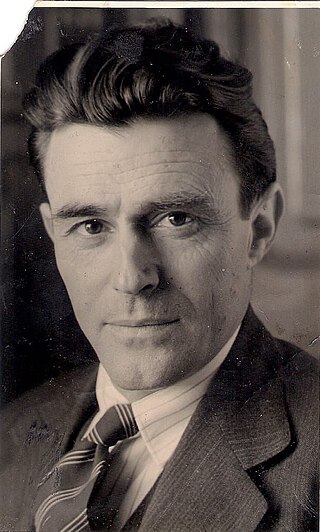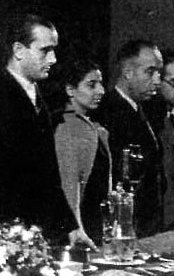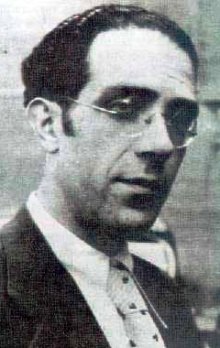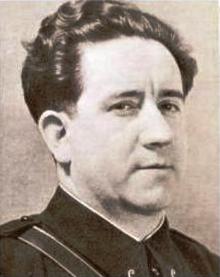| Part of a series on the |
| Communist Party of Spain |
|---|
 |
Politics of Spain |
Mundo Obrero (Spanish: Workers World) is the periodical of the Communist Party of Spain (PCE). [1] The paper is based in Madrid, Spain.
| Part of a series on the |
| Communist Party of Spain |
|---|
 |
Politics of Spain |
Mundo Obrero (Spanish: Workers World) is the periodical of the Communist Party of Spain (PCE). [1] The paper is based in Madrid, Spain.

Mundo Obrero was first published on 14 November 1931. [2] [3] During its initial phase the paper was edited by the Peruvian journalist César Falcón and was financed by the Soviet Union. [3] Its headquarters is in Madrid. [4] One of its notable contributors was Dolores Ibárruri. [5] Its editor-in-chief was Jesus Hernández at the outbreak of the Spanish Civil War. [6] The paper was illegally published during the rule of Franco [2] and adopted a strict Bolshevist stance arguing that capitalism, social democracy and Trotskyism were all threatening views. [7]
The paper is published fortnightly [1] and contains articles related to the Spanish and international political situations, the opinions of the different bodies of the party as well as relevant party members, and on the activities of the Party and the Communist Youth Union of Spain (UJCE).

A fifth column is a group of people who undermine a larger group or nation from within, usually in favor of an enemy group or another nation. The activities of a fifth column can be overt or clandestine. Forces gathered in secret can mobilize openly to assist an external attack. The term is also applied to organized actions by military personnel. Clandestine fifth column activities can involve acts of sabotage, disinformation, espionage or terrorism executed within defense lines by secret sympathizers with an external force.

The Communist Party of Spain is a communist party that, since 1986, has been part of the United Left coalition, which is currently part of Sumar. Two of its politicians are Spanish government ministers: Yolanda Díaz and Sira Rego.

Isidora Dolores Ibárruri Gómez, also known as Pasionaria, was a Spanish Republican politician during the Spanish Civil War (1936–1939) and a communist. She is renowned for her slogan ¡No Pasarán!, which she issued during the Battle for Madrid in November 1936.

José Díaz Ramos was a Spanish trade unionist and communist politician. He was the General Secretary of the Communist Party of Spain during the Spanish Civil War.
El Debate is a defunct Spanish Catholic daily newspaper, published in Madrid between 1910 and 1936. It was the most important Catholic newspaper of its time in Spain.

El Socialista is a socialist newspaper published in Madrid, Spain. The paper is the organ of the Spanish Socialist Workers' Party (PSOE).

Irene Rodríguez, née Irene Carlota Berta Lewy y Rodríguez was a Spanish journalist, feminist, pacifist and Communist activist. For many years she was the assistant of Dolores Ibárruri, leader of the Spanish Communist Party, and she is best known for this role. After the Spanish Civil War she was forced into exile in Moscow and Beijing. She returned to Spain after the return to democracy in 1977.

Encarnación Fuyola Miret was a Spanish teacher and Communist activist who played a significant role as a propagandist in the period leading up to and during the Spanish Civil War. Later she went into exile in Mexico.

Pedro Fernández Checa, usually known as Pedro Checa was a Spanish Communist who played a leading role in the party during the Spanish Civil War (1936–39). After the defeat of the Republic he was forced into exile in the Soviet Union and then Mexico, where he died.

Jesús Hernández Tomás was a Spanish communist leader. During the Spanish Civil War (1936–1939) he was Minister of Education and Fine Arts, then Minister of Education and Health. After the war he went into exile in Oran, Moscow and then Mexico. He was expelled from the party in 1944 for disloyalty to the leadership, and purged from the official history of the party after writing a book in 1953 critical of the Stalinist role in the Civil War.

Antonio Mije García was a member of the Spanish Communist Party who became a deputy for Seville in the Second Spanish Republic. He served in various senior positions during the Spanish Civil War (1936–39). After the war he lived in France, Mexico and Czechoslovakia. He managed to retain his position as a party executive during the internecine struggles of the long years of exile.

Vicente Uribe Galdeano was a Spanish metalworker and politician who became a member of the executive of the Communist Party of Spain (PCE). He served as Minister of Agriculture during the Spanish Civil War (1936–1939) for the Republican faction. He went into exile in Mexico during World War II (1939–1945), then lived in France and Czechoslovakia after the war. He was disgraced in 1956 during the post-Stalinist power struggle.

José Cazorla Maure was a Spanish communist leader during the Spanish Civil War (1936–1939). He was one of the leaders of the Unified Socialist Youth. For several months in 1936–1937, he was a member of the Madrid Defense Council in charge of public order. He was ruthless in weeding out sabotage or subversion, and earned the hostility of the anarchists and Trotskyites. Later, he was made governor of the province of Albacete and then of the province of Guadalajara. He remained in Spain after the war, and was arrested and executed by firing squad.

Francisco Antón Sanz was a Spanish communist leader. He is known as the lover of Dolores Ibárruri during and after the Spanish Civil War (1936–1939). After the Republican defeat in 1939 he went into exile in France, Moscow, Mexico, Poland and Czechoslovakia. During an internal power struggle in the early 1950s he was ousted from the leadership of the Spanish Communist Party (PCE), but was later rehabilitated.

Juan Domingo Astigarrabía Andonegui was a Basque communist politician, one of the founders of the Communist Party of the Basque Country and its first secretary-general. He was made a scapegoat for the fall of the North during the Spanish Civil War (1936–1939). He was expelled from the party and went into exile in Panama. Later he was rehabilitated and returned to Spain.

Gabriel León Trilla was a Spanish communist leader who was one of the founders of the Spanish Communist Party while in exile in Paris in the 1920s. He was expelled from the party in 1932 for supporting the Republican government, but was readmitted at the start of the Spanish Civil War (1936–39). During World War II (1939–45) he helped organize Spanish refugees in Spain as members of the French Resistance, then moved to Spain where he ran an underground newspaper. He was assassinated in 1945 on orders of the Communist Party of Spain on the grounds that his independent actions had endangered other communists.

Manuel Azcárate Diz was a Spanish journalist, politician and a leader of the Communist Party of Spain in the 1960s and 1970s.
Women in the Workers' Party of Marxist Unification were faced with many of the same problems as other Communist and Anarchist women in the 1930s, such as hypocrisy of the male leadership in their support of women's rights, while continuing their sexist and patriarchal behavior in private.
Women in the Communist Party of Spain were highly active, the most visible figure in the movement being Dolores Ibárruri, who joined in its early years. The Dictatorship of Primo de Rivera pushed the group underground, where they had to meet clandestinely around their public face, the football club Oriente FC.

Women in the Second Republic period were formally allowed to enter the public sphere for the first time in Spanish cultural life, where they had a number of rights they had lacked before including the right to vote, divorce and access to higher education. The Second Spanish Republic had three elections, ones in 1931, 1933 and 1936. Women were able to run in all three and vote in the last two. Clara Campoamor Rodríguez, Victoria Kent Siano, and Margarita Nelken y Mansbergen were the most important women to emerge in this period.